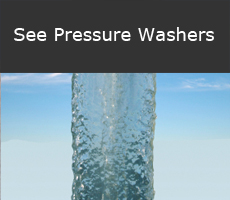Commercial Pressure Washer – How to Choose
There are hundreds of different types of pressure washer on the market and many of us have one for cleaning our car or patio for example. Commercial pressure washers have become an important part of the cleaning regime in many commercial sectors too, and the variations of size, duty, type and accessories can be confusing.
Here are some things to consider when choosing a commercial pressure washer:
- Do you need a cold or hot water pressure washer?
- Is a steam option required?
- Is water pressure or flow rate more important?
- What type of power – electric or petrol/diesel?
- Is there access to a water supply?
Here’s our guidance on choosing a pressure washer to suit your needs.
Commercial Pressure Washer – Cold Water
The cleaning effect of a cold water pressure washer is achieved through the water penetrating the dirt to wash it away. The use of pressure can be very effective in cleaning dirt and grime, although may not be adequate for certain types of deposit such as oil or grease.
Commercial Pressure Washer – Hot Water
A hot water pressure washer works better on oily or greasy deposits, as the heat in the hot water helps to soften and emulsify the deposits, so they can be loosened and washed away.
Pressure Washers with Steam
Where additional cleaning power is required, a hot water pressure washer with a steam facility is an option. The steam is created by reducing the pressure in the machine but letting the burner run until the water turns to steam. Several of the commercial pressure washers we supply have variable temperature ranges, capable of producing steam.
Pressure Washer Pressure and Flow Rate
You may think that pressure is the most important factor in a pressure washer. Water applied to a surface at high pressure does shift dirt, but it also restricts the operation to a small area.
Pressure washers like B&G’s Red Mist, which discharges super-hot water, with very high pressure and low flow rate, are ideal for cleaning dirt from delicate surfaces, such as masonry.
A washer with a greater flow rate is more useful for cleaning large flat areas where the washing can be carried out more speedily. See our pressure washer glossary for more information.
For driveways, concrete floors and other flat surfaces, an accessory like the Whirlaway improves applies the water close to the ground, in different directions, so reducing water usage and overspray.
Electric or Engine Driven Pressure Washers
A pressure washer is most typically electric powered, but this is not always suitable as the machine may be required to be used off site where electricity is not readily available. In this case a diesel or petrol pressure washer is an alternative, possibly with its own water tank for completely independent cleaning.
Pressure washers with tanks
When cleaning larger areas such as car parks, or building exteriors, you may not have easy access to water. A bowser pressure washer with it’s own tank can be trailer mounted, so can be used anywhere.
These are just a few of the things to consider when selecting a commercial pressure washer. The more sophisticated models are naturally more expensive, so it is important to select the model that is the most suitable for the cleaning you need to do and the level of usage it will get.
To make sure you select the correct commercial pressure washer, contact us for advice and a great deal on leading brand machines.
Article originally published 21st November 2017.
Reviewed and updated by Ian Hodkinson 16th December 2020.


